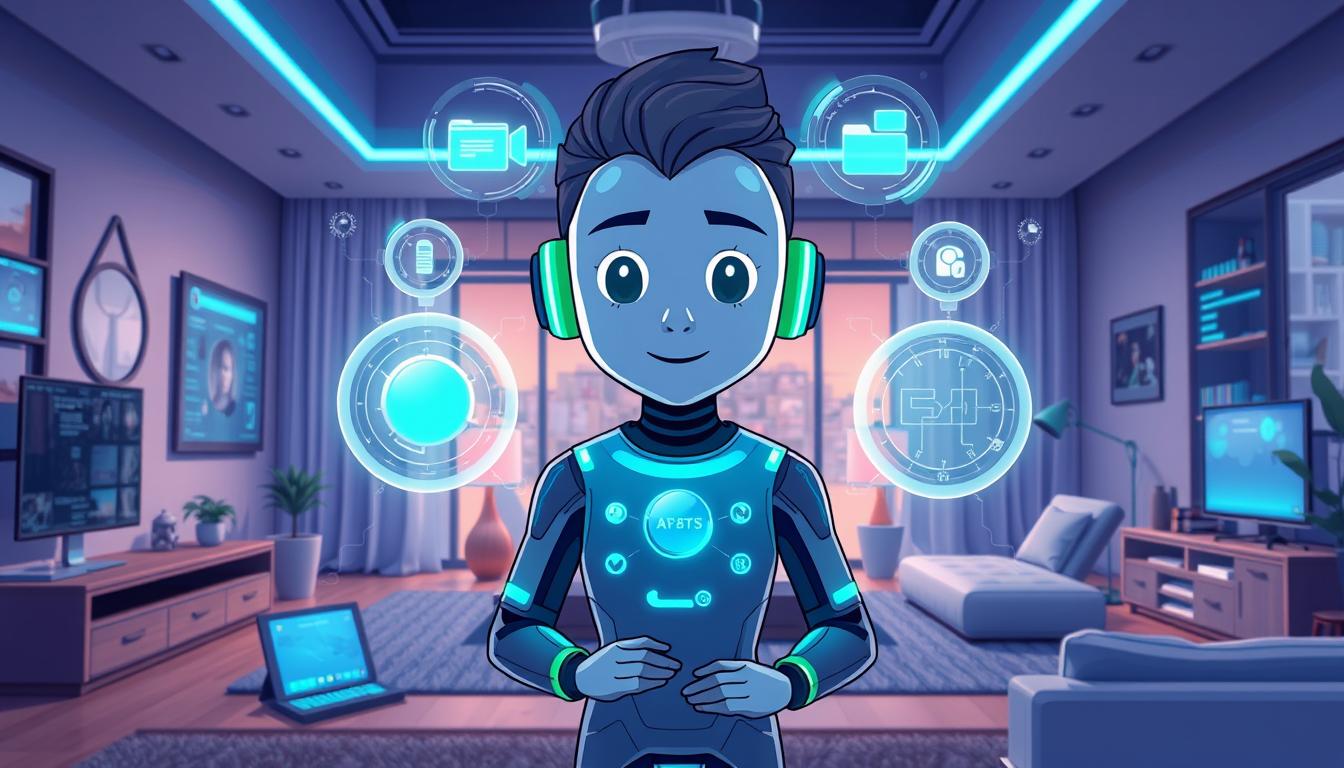AI-Powered Digital Assistants: Your Smart Companions
Ever thought about having a personal assistant all day, every day? AI-powered digital assistants are making this dream real. They’re changing our daily lives and making us more productive in amazing ways. These smart virtual helpers are now a big part of our lives, ready to assist with anything we need.
They can do everything from reminding you of appointments to controlling your smart home. These digital friends use advanced tech like natural language processing to get what you mean. And with machine learning, they get better at helping you over time. As they grow smarter, they’re not just doing what you tell them. They’re also thinking ahead and suggesting ways to make your life easier.
Key Takeaways
- AI-powered digital assistants are revolutionizing daily tasks and productivity
- Virtual assistants use advanced technologies like natural language processing
- Intelligent assistants can control smart home devices and set reminders
- These digital companions are becoming more intuitive and personalized
- AI assistants are continuously learning to better serve user needs
The Rise of Intelligent Virtual Assistants
Virtual assistants have moved from science fiction to our everyday lives. These AI tools change how we use technology. They make our work easier and more efficient.
From Science Fiction to Reality
Conversational AI has changed our digital world. What was once a dream is now a reality. Now, we can control devices and get information just by talking.
Key Players in the Digital Assistant Market
Big tech companies are leading in digital assistant development. Apple’s Siri, Google Assistant, and Amazon’s Alexa are at the top. These AI chatbots are key in homes and businesses.
| Company | Assistant | Key Feature |
|---|---|---|
| Apple | Siri | Seamless integration across Apple devices |
| Google Assistant | Advanced natural language processing | |
| Amazon | Alexa | Smart home integration |
Impact on Daily Life and Productivity
AI assistants have changed our daily lives. They help with schedules, answer questions, and control smart homes. In business, they make things more efficient. For example, Amazon credits 35% of its sales to AI suggestions.
“Companies excelling in customer experience see revenue growth that is 5.1 times higher than those lagging behind.” – Forrester report
As AI gets better, we’ll see even more advanced digital helpers. They will keep changing how we live and work.
Understanding AI-Powered Digital Assistants
AI assistants change how we use technology. They use smart algorithms and learn from us. This makes our lives simpler and more efficient.
These digital helpers can do many things. They answer questions and manage our schedules. They get better with time, giving us more tailored experiences.
| Industry | AI Assistant Application | Benefits |
|---|---|---|
| Finance | Automated customer service, fraud detection | Reduced errors, faster processing |
| Healthcare | Patient monitoring, appointment scheduling | Improved patient care, efficient operations |
| Retail | Personalized recommendations, inventory management | Enhanced customer experience, optimized stock levels |
The use of AI assistants is growing fast. For example, Xiaoice, a chatbot by Microsoft, has over 660 million users. This shows how much we rely on AI in our daily lives.
“AI assistants are not just tools; they’re becoming our digital companions, understanding our needs and adapting to our preferences.”
As AI gets better, we’ll see more advanced language and voice recognition. This will make AI assistants even more useful in the future.
Natural Language Processing: The Core of Conversational AI
Natural language processing (NLP) is key to conversational AI. It lets digital assistants understand and talk back to us like humans. This tech has changed how we talk to machines, making it easier and more natural.
How NLP Enables Human-Like Interactions
NLP helps AI assistants get what we mean, including our tone and feelings. They break down our words into parts to understand us better. This way, they can give us answers that make sense and are relevant.
Advancements in Language Understanding
There have been big steps forward in how AI understands language. For example, OpenAI’s o1 model is really good at solving complex problems. It even beat GPT-4o in 54 out of 57 tests, showing it’s very smart at understanding language.
Challenges in Multilingual Support
But, AI still struggles with talking to people in different languages. It’s hard for them to understand and answer in many languages and dialects. Developers are working hard to make AI better at this, so it can talk to people all over the world.
“The future of conversational AI lies in its ability to understand and communicate across languages as fluently as humans do.”
Voice Recognition Technology: Speaking Your Commands
Voice recognition has changed how we use digital devices. It turns our words into text, letting us control devices without our hands. This tech makes daily tasks simpler and more accessible.
Speech-to-text systems have gotten much better. They can understand different accents and work well even when it’s loud. This has made voice-controlled assistants more friendly and popular.
- Home automation: Control smart devices with simple voice commands
- Accessibility: Help people with disabilities interact with technology
- Productivity: Dictate emails, messages, and documents hands-free
- Customer service: Power chatbots and virtual assistants for businesses
As voice recognition tech keeps getting better, we’ll see even more natural interactions with digital helpers. The future of talking to computers is looking bright. It will make technology a bigger part of our everyday lives.
| Feature | Benefit |
|---|---|
| Accent recognition | Improved accessibility for diverse users |
| Noise cancellation | Better performance in various environments |
| Natural language processing | More intuitive user interactions |
| Continuous learning | Enhanced accuracy over time |
Machine Learning: Enhancing Assistant Intelligence Over Time
AI-powered digital assistants are getting smarter thanks to machine learning. These smart companions use AI learning to improve their skills and tailor responses to each user. Let’s explore how this technology is shaping the future of digital assistants.
Personalization Through User Data
Digital assistants use machine learning to analyze your habits and preferences. They learn from your daily interactions, creating a personalized experience. For example, they might suggest your favorite coffee shop when you ask for directions in the morning.
Continuous Improvement Algorithms
AI learning never stops. Digital assistants use algorithms to get better over time. They learn from millions of interactions, improving their language understanding and response accuracy. The o1-preview model, for instance, scored 79.7% in the Aider Benchmark, showcasing the power of these algorithms.
Ethical Considerations in AI Learning
As AI assistants become smarter, we must consider the ethical implications. Privacy concerns arise when assistants collect and use personal data for personalization. Developers must balance improving AI capabilities with protecting user information.
| Model | Benchmark Score | Pricing |
|---|---|---|
| o1-preview | 79.7% | Higher than average |
| claude-3.5-sonnet | 77.4% | Competitive |
| o1-mini | Below GPT-4o and Claude 3.5 Sonnet | Similar to GPT-4o and Claude 3.5 Sonnet |
The future of AI assistants looks bright, with models like UI-JEPA showing promise. This model uses just 3 billion parameters yet performs comparably to larger cloud-based models. As machine learning advances, we can expect even more intelligent and helpful digital assistants in our daily lives.
AI-Powered Digital Assistants in Various Industries
AI-powered digital assistants are changing many industries. They make businesses run better and improve how we interact with them. This change is seen in finance, healthcare, and more.
In finance, AI assistants are making a big difference. They quickly analyze lots of data, helping traders make fast decisions. Banks use them to give personalized advice, making customers happier.
AI chatbots are always ready to help, from checking balances to giving financial advice. They work day and night.
In healthcare, AI assistants are also making a big impact. They help doctors by analyzing symptoms and suggesting treatments. They even help with surgeries.
In manufacturing, AI assistants help too. They make production better, predict when things might break, and manage the supply chain. They also check the quality of what’s made.
| Industry | AI Assistant Application | Benefits |
|---|---|---|
| Finance | Real-time data analysis, Personalized advice | Better trading decisions, Enhanced customer experience |
| Healthcare | Diagnostic tools, Predictive analytics | Improved patient outcomes, Efficient treatment plans |
| Manufacturing | Process optimization, Predictive maintenance | Increased efficiency, Reduced downtime |
As AI gets better, we’ll see even more cool uses in different fields. AI assistants are key to the future of many industries.
Smart Home Integration: Your AI Butler at Home
Smart home integration has changed how we live. AI-powered digital assistants act as virtual butlers. They control IoT devices and make our daily lives easier.
Controlling IoT Devices with Voice Commands
Voice-activated control is key in smart home automation. With just a voice command, you can change lights, temperature, or even start your coffee. This makes daily tasks quick and easy.
Energy Management and Automation
AI assistants are great at saving energy. They learn your habits and adjust settings to use less energy. For example, they can turn off lights when no one is around or adjust the heating based on your schedule.
Security and Privacy Concerns
Smart home integration brings many benefits but also raises security and privacy issues. The connected nature of IoT devices can make them vulnerable to cyber attacks. It’s important for users to protect their data and use strong security measures.
| Aspect | Benefit | Concern |
|---|---|---|
| Convenience | Voice-controlled devices | Potential privacy breaches |
| Efficiency | Automated energy management | Dependency on technology |
| Security | Remote monitoring | Vulnerability to hacking |
As smart home integration grows, finding a balance between convenience and security is key. By staying informed and taking precautions, users can enjoy their AI-powered home assistants while keeping their homes safe.
The Future of AI Assistants: Emerging Trends
AI assistant trends show a future where virtual helpers get smarter and more part of our lives. As AI keeps getting better, our interactions with these digital friends will change a lot.
AI assistants will soon understand and react to our feelings. This emotional smarts will help them offer more tailored and caring support. It’s like how Netflix knows what movies you’ll like, keeping you happy.
We’ll see more ways to talk to AI assistants. They’ll use voice, touch, and sight, making it easier and more natural to use them. This is similar to how Apple makes sure all its products work well together.
| AI Assistant Trend | Potential Impact |
|---|---|
| Emotional Intelligence | Enhanced personalization and support |
| Multimodal Interactions | More intuitive user experience |
| Specialized Assistants | Improved efficiency in specific tasks |
| Cross-platform Integration | Seamless user experience across devices |
AI will soon have specialized helpers for different areas like healthcare and finance. These experts could make big changes in many fields, just like Amazon’s personalized shopping does.
The future of AI assistants looks very promising. It will change how we use technology and live our daily lives. But, we must think about the ethics and make sure AI helps us, not just replaces us.
Overcoming Challenges: Privacy, Security, and Ethical Use
AI-powered digital assistants make life easier but raise big questions about privacy and security. As they become part of our daily lives, keeping our data safe is vital. Companies must use strong security to protect our personal info from hackers and unauthorized access.
AI ethics are crucial in making and using these digital helpers. It’s important for AI to be open about its decisions to gain our trust. Also, fixing AI’s biases is a big challenge that needs constant work from developers and researchers.
Leaders in the tech world and lawmakers are creating rules for AI. They want to make sure AI grows but also keeps users safe. Some key areas they focus on include:
- Getting clear consent for data use
- Using strong encryption
- Doing regular security checks and updates
- Creating AI that’s fair and unbiased
A recent study highlights how important these issues are:
| Concern | Percentage of Users |
|---|---|
| Data Privacy | 78% |
| Cybersecurity | 65% |
| AI Ethics | 52% |
As AI assistants get better, finding a balance between their usefulness and ethics is essential. This balance will help them become a big part of our lives and succeed in the long run.
Conclusion: Embracing the AI Assistant Revolution
The AI assistant revolution is changing our digital world. It brings many benefits and drives digital change. These smart helpers are now key to our daily lives, making us more productive and efficient in many fields.
Looking ahead, AI’s future looks bright. Advances in natural language processing and machine learning will make interactions even more natural.
Recent numbers show AI’s growing influence. For example, 86% of programmers use AI tools in their work. And 71% think these tools can really improve productivity.
AI chatbots are also making a big difference. They give quick answers, freeing up people for more complex tasks. Plus, AI scheduling tools help teams by suggesting the best meeting times.
But, there are still challenges. Privacy worries are real, like the European Union’s check on Google’s AI model. Trust issues also exist, with many Americans doubting AI in elections.
To fully benefit from AI assistants, we need to tackle these problems. We must innovate while keeping ethics and user needs in mind. As we dive into this tech revolution, finding the right balance is key.
Source Links
- The Ultimate Guide to StarknightMT UTV Accessories: Elevating Your Off-Road Experience – Vents Magazine
- Xodo | PDF Editor & Converter 9.4.2 (Pro) (Mod Extra) (x86)
- Streamlining the Customer Experience to Maximize Revenue: A Strategic Guide for Chief Revenue Officers
- The insane new AI tools available for real estate agents – HousingWire
- Johnstown technology company builds new AI products, hires executive
- How AI Is Transforming The Finance Industry
- AI chatbot assistants growing more sophisticated – and addictive
- How I Changed My Learning Game in the Age of AI
- This is a great AI voice recorder, and it’s totally doomed
- Chatting with ChatGPT found to soften beliefs of conspiracy theorists
- Be connected with Nextcloud Hub 9
- Stuck-in-space astronauts make first public comments since Boeing capsule left without them
- Putin threatens war with NATO as Russian military aircraft spotted off Alaska
- OpenAI o1 Release is so Reminiscent of Apple Events – it’s an Incremental Update
- Apple aims for on-device user intent understanding with UI-JEPA models
- How Much Are Companies Investing in AI?
- Diving Deeper into Reverse Logistics
- Is That Text Message From Your Bank Legit? How to Detect and Avoid SMS Phishing Scams
- OVG Hospitality expands in Latin America – Coliseum
- Farnek Services LLC – HITEK Develops Innovative Community App for MAG City
- Arizona opinion: Prop 134: Ensuring every Arizonan has a voice
- The Prevalence and Correlates of Anxiety, Stress, Mood Disorders, and Sleep Disturbances in Poland after the Outbreak of the Russian–Ukrainian War 2022
- Turning community bank employees into AI enthusiasts
- Text mining method to unravel long COVID’s clinical condition in hospitalized patients – Cell Death & Disease
- Artificial intelligence – Reasoning, Algorithms, Automation
- Programmer’s Day Special: How coders perceive AI coding tools – a friend or a foe
- Here’s how you can enhance team collaboration and communication in the workplace with AI.







